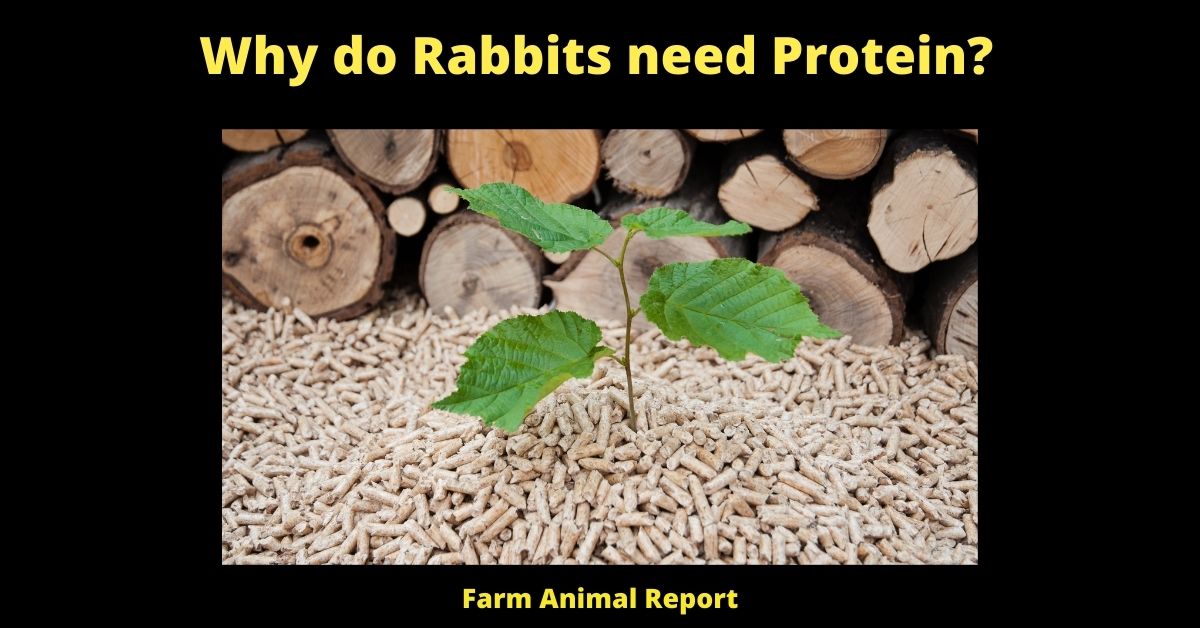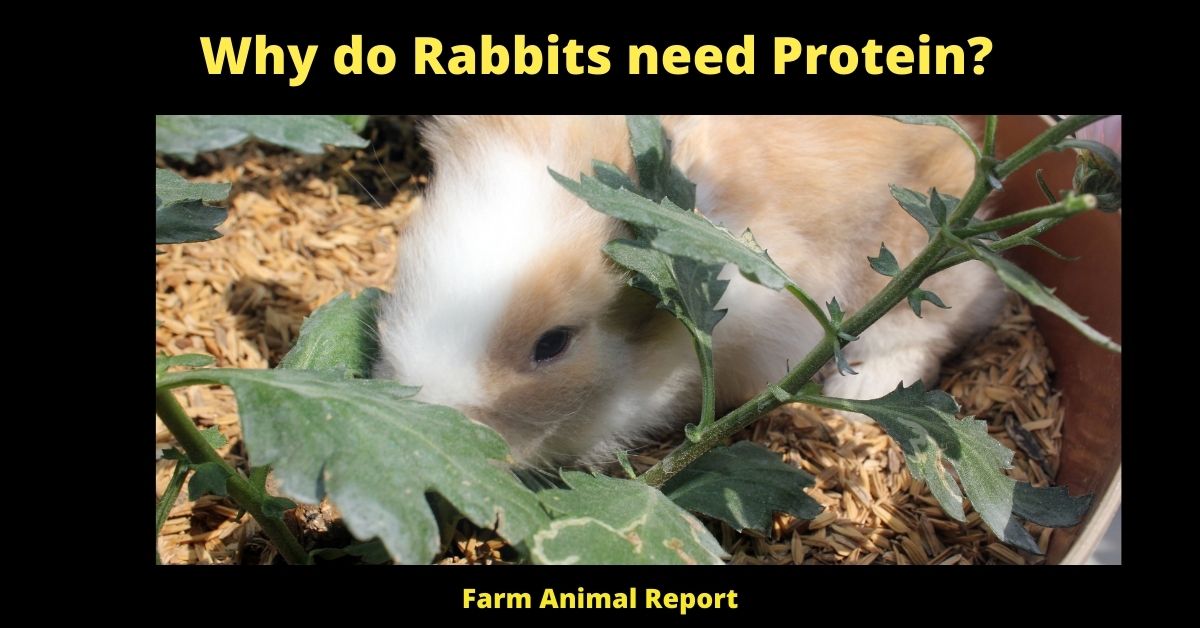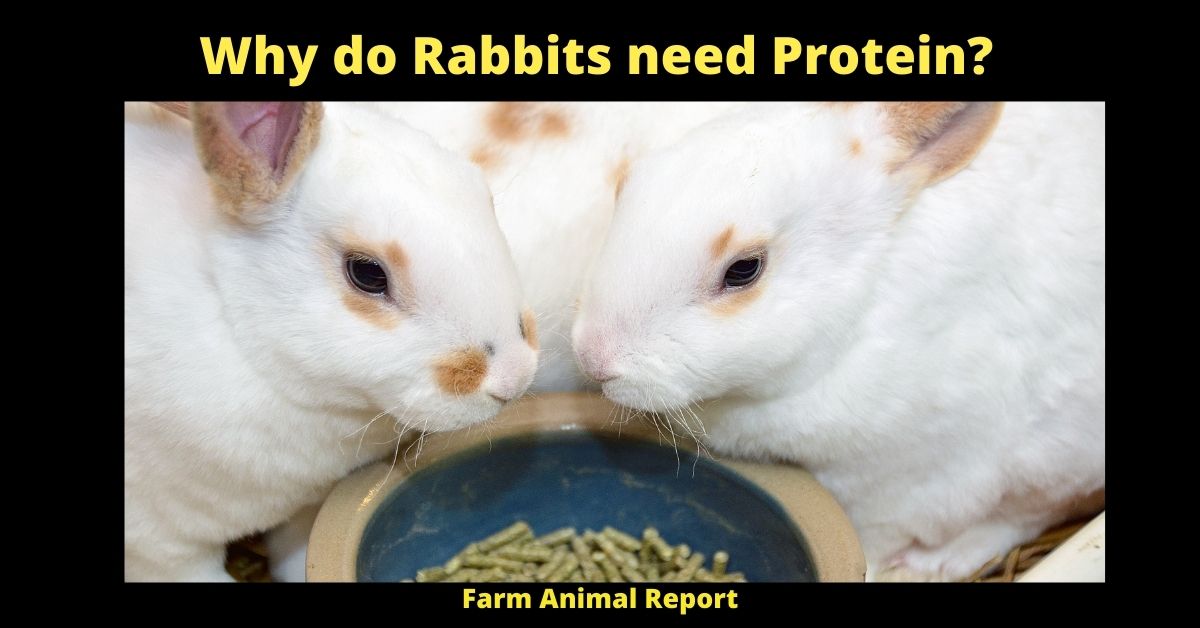As a General Rule – Rabbits need 12-14% protein in their diet to stay healthy. Protein is important for many different functions in rabbits including cell growth, repair, the production of enzymes and hormones, and fur coat maintenance.
Why do Rabbits need Protein?
Rabbits are herbivores, which means that they primarily eat plants. However, that doesn’t mean that they don’t need protein in their diet! In fact, rabbits need about 12-14% protein in their diet to stay healthy. This blog post will discuss the importance of protein for rabbits and provide some tips on how to ensure your rabbit gets enough protein.
Why do Rabbits need Protein?
Protein is in the development process of rabbits. It helps with the growth of new cells and the repair of old cells. Protein is also necessary for the production of enzymes and hormones. Jump to 18 Ways to Make Money by Rabbit Farming **CHARTS**
What is Protein?
Protein is a macronutrient that is essential for the growth and maintenance of all tissues in the body. It is made up of amino acids, which are the building blocks of proteins. There are 20 different amino acids that can be used to make proteins, and 11 of these amino acids can be produced by the rabbit’s body. The other nine must be obtained from their diet. Why do Rabbits need Protein?
What does Protein do for Rabbits?
Protein is important for many different functions in rabbits. As mentioned before, it helps with cell growth and repair. It is also necessary for the production of enzymes and hormones. Additionally, protein helps to maintain the rabbit’s fur coat and aids in digestion.
Tips for Ensuring Your Rabbit Gets Enough Protein
There are a few things you can do to make sure your rabbit is getting enough protein in its diet:
- Offer a variety of fresh vegetables and fruits. While rabbits primarily eat plants, they still need some variety in their diet to get all the nutrients they need. Include leafy greens, root vegetables, and occasional fruits in their diet.
- Provide hay at all times. Hay is an excellent source of fiber and nutrients for rabbits. It also helps to keep their digestive system running smoothly.
- Give them a high-quality diet pellet. Diet pellets are formulated to provide rabbits with the nutrients they need, including protein. Look for a pellet that is high in fiber and low in sugar.

What are the Major Parts of a Rabbit’s Digestive System?
Protein moves through a rabbits digestion system by way of the following major parts:
The stomach is a muscular sac that stores food and begins the process of digestion. Food enters the stomach and is mixed with gastric juices before moving into the small intestine.
The small intestine is a long, coiled tube where most of the absorption of nutrients takes place. The intestines are lined with tiny finger-like projections called villi, which absorb nutrients from food as it passes through.
The large intestine is a shorter, wider tube that absorbs water and electrolytes from digested food before it is passed as feces.
The cecum is a blind pouch located at the junction of the small and large intestines. The cecum ferments plant fiber which produces nutrients that the rabbit can absorb.
The colon is the final section of the large intestine where water is absorbed and feces are formed.
The anus is the opening at the end of the digestive tract through which feces are passed.
Rabbits are Herbivores
A Rabbits diet consists mainly of hay, fresh vegetables and fruits, and a small amount of pellets.
Rabbits need 12-14% protein in their diet to stay healthy.
Protein is important for many different functions in rabbits including cell growth, repair, the production of enzymes and hormones, and fur coat maintenance.
You can ensure your rabbit is getting enough protein by offering a variety of fresh vegetables and fruits, providing hay at all times, and giving them a high-quality diet pellet.
A major part of a rabbit’s digestive system is The Cecum which ferments plant fiber and produces nutrients that the rabbit can absorb.
The cecum is an important part of the rabbit’s digestive system. It is a blind pouch located at the junction of the small and large intestines. The cecum ferments plant fiber which produces nutrients that the rabbit can absorb.
The colon is the final section of the large intestine where water is absorbed and feces are formed. The anus is the opening at the end of the digestive tract through which feces are passed.
Rabbits are Hindgut Digesters
Rabbits are hindgut digesters, meaning that they ferment food in their cecum to extract nutrients. This process produces vitamin B and short-chain fatty acids, which are essential for rabbits. Fiber is also an important part of a rabbit’s diet as it helps to keep their gut healthy and prevents digestive problems.
What percentages of Protein, carbohydrates, and five do rabbits need?
Protein should make up 12-14% of a rabbits diet, carbohydrates should be no more than 50%, and fat should be no more than
A healthy diet for a rabbit is 70-80% hay, 15-20% fresh vegetables, and 0-15% pellets. The ideal ratio of these three components is 12-14% protein, 50% carbohydrates, and 35% fiber. Fat should be no more than .35%.
How do Bacteria help with Digestion?
The role of bacteria and protein is important for many different functions in rabbits including cell growth, repair, the production of enzymes and hormones, and fur coat maintenance.
Bacteria also help with digestion by breaking down plant fiber which the rabbit can then absorb as nutrients. This process is called fermentation and it takes place in the cecum.
Fermentation produces vitamin B and short-chain fatty acids, which are essential for rabbits. Fiber is also an important part of a rabbit’s diet as it helps to keep their gut healthy and prevents digestive problems.
What are Cecotropes? / Night Droppings
The amount of protein in a rabbit’s diet is important for many different functions, including cell growth, repair, the production of enzymes and hormones, and fur coat maintenance.
Rabbits also need bacteria in their gut to help with digestion. Bacteria help break down plant fiber which the rabbit can then absorb as nutrients. This process is called fermentation and it takes place in the cecum.
Fermentation produces vitamin B and short-chain fatty acids, which are essential for rabbits. Fiber is also an important part of a rabbit’s diet as it helps to keep their gut healthy and prevents digestive problems.
Cecotropes are soft, moist pellets that are produced by the cecum (a blind pouch located at the junction of the small and large intestines). Cecotropes are an important part of a rabbit’s diet because they contain bacteria, fiber, and nutrients that the rabbit needs to stay healthy.
Rabbits usually eat their cecotropes at night, which is why they are sometimes called “night droppings.”

How is the Rabbit’s Gut Flora Kept Balanced?
A healthy diet for a rabbit is 70-80% hay, 15-20% fresh vegetables, and 0-15% pellets. The ideal ratio of these three components is 12-14% protein, 50% carbohydrates, and 35% fiber. Fat should be no more than .35%.
Providing hay at all times and offering a variety of fresh vegetables will help keep a rabbit’s gut flora balanced. It is also important to avoid giving too many pellets as they are high in carbohydrates.
A healthy diet, along with adequate exercise and clean water, will help keep a rabbit’s gut healthy and prevent digestive problems.
If you think your rabbit may be sick, please contact a veterinarian as soon as possible. Digestive problems can quickly become serious in rabbits and can even be fatal if not treated promptly.
How much Protein should a Rabbit Consume Each Day?
A rabbit’s daily diet should consist of 12-14% protein. This percentage is important for many different functions in rabbits, including cell growth, repair, the production of enzymes and hormones, and fur coat maintenance.
If a rabbit does not consume enough protein, it may experience health problems such as poor growth, muscle wasting, and a dull coat. If you think your rabbit is not getting enough protein in its diet, please contact a veterinarian.
The Consequences of not having enough Protein in a Rabbit’s Diet?
If a rabbit does not consume enough protein, it may experience health problems such as poor growth, muscle wasting, and a dull coat. If you think your rabbit is not getting enough protein in its diet, please contact a veterinarian.
The signs your Rabbit is not getting enough Protein:
Some signs that your rabbit is not getting enough protein in its diet include poor growth, muscle wasting, and a dull coat. If you notice any of these signs, please contact a veterinarian.
Why is it important that Rabbits get enough Protein in their Diet?
Protein is essential for many different functions in rabbits, including cell growth, repair, the production of enzymes and hormones, and fur coat maintenance. If a rabbit does not consume enough protein, it may experience health problems such as poor growth, muscle wasting, and a dull coat.
Providing hay at all times and offering a variety of fresh vegetables will help keep a rabbit’s gut flora balanced. It is also important to avoid giving too many pellets as they are high in carbohydrates.
A healthy diet, along with adequate exercise and clean water, will help keep a rabbit’s gut healthy and prevent digestive problems. If you think your rabbit may be sick, please contact a veterinarian as soon as possible. Digestive problems can quickly become serious in rabbits and can even be fatal if not treated promptly.
How does Protein Move through a Rabbit’s Digestive System?
A rabbit eats food that contains protein. This protein is then broken down by the rabbit’s stomach acid and enzymes into smaller peptides and amino acids. The small intestine absorbs these small peptides and amino acids which are then used by the body for various functions such as cell growth and repair, the production of enzymes and hormones, and fur coat maintenance.
The large intestine further breaks down fiber which provides nutrients for the good bacteria in the cecum. The cecum produces cecotropes, which are soft, moist pellets that contain bacteria, fiber, and nutrients that rabbits need to stay healthy. Rabbits usually eat their cecotropes at night.
What Foods for Rabbits are High in Protein?
Foods that have high protein levels for rabbits include hay, fresh vegetables, and a variety of fruits.
What Vegetables are High in Protein?
Vegetables that have high protein levels for rabbits include broccoli, cabbage, carrots, celery, and kale.
What Fruits Are High in protein?
Fruits that have high protein levels for rabbits include apples, bananas, and strawberries.
What does Healthy Rabbit Poop Look Like?
A healthy rabbit’s poop should be small, dry pellets that are brown in color. If a rabbit’s poop is soft or has a lot of liquid it may be an indication of dehydration or diarrhea. Diarrhea can quickly become serious in rabbits and can even be fatal if not treated promptly, so if you notice any changes in your rabbit’s poop please contact a veterinarian as soon as possible.
What is Rabbit Cecotropes?
Rabbit cecotropes are soft, moist pellets that contain bacteria, fiber, and nutrients that rabbits need to stay healthy. Rabbits usually eat their cecotropes at night. Cecotropes are produced by the cecum, which is located at the junction of the small intestine and large intestine. The cecum is an important part of the digestive system as it breaks down fiber which provides nutrients for the good bacteria in the cecum.
Final Thoughts – Why do Rabbits Need Protein?
Protein is a critical part of a rabbit’s diet as it helps with various functions such as cell growth, repair, the production of enzymes and hormones, and fur coat maintenance. A healthy diet for a rabbit includes hay, fresh vegetables, and a variety of fruits. It is also important to provide clean water and adequate exercise.
If you think your rabbit may be sick, please contact a veterinarian as soon as possible. Digestive problems can quickly become serious in rabbits and can even be fatal if not treated promptly.





